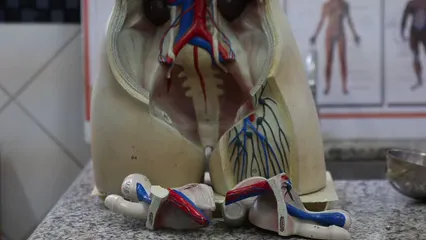Introduction
A heart murmur in dogs is an unusual sound made by blood flow turbulence in the heart. It can be a critical sign of underlying health issues. Detecting a murmur during a routine vet check is essential. Early evaluation can prevent serious complications down the line.
To ensure you’re prepared for any unexpected health issues, consider investing in a Pet First Aid Kit. This can be a lifesaver for emergencies, providing you with the tools needed to handle minor injuries and health scares at home.
Summary and Overview
The heart of a dog consists of four chambers: two atria and two ventricles. Valves between these chambers ensure blood flows in one direction. When blood moves smoothly, it creates the familiar “lub-dub” sound. A heart murmur alters this sound, often introducing a whooshing noise.

Veterinarians detect murmurs using a stethoscope. They assess the sound’s intensity, timing, and location on the chest. Murmurs fall into two categories: innocent (physiologic) and pathological. Innocent murmurs are harmless and common in puppies, often disappearing as they mature. Pathological murmurs might indicate heart disease or other serious conditions.
Proper diagnosis is crucial for monitoring. Treatment varies based on the murmur’s cause and severity. Innocent murmurs may require no action, while pathological murmurs could necessitate medication or surgery. Regular check-ups with your veterinarian are vital to maintaining your dog’s health.

To help monitor your pup’s health, consider a Dog Health Tracker Smart Collar. This innovative gadget can help you keep tabs on your dog’s activity levels and health metrics, ensuring your furry friend stays in tip-top shape!
What is a Heart Murmur?
A heart murmur is an abnormal sound produced by turbulent blood flow in the heart. This noise disrupts the usual rhythm of a dog’s heartbeat. During a veterinary exam, a vet listens for these sounds with a stethoscope.
Normal heart sounds include a rhythmic “lub-dub.” Murmurs create additional noises, such as a “whoosh” or “shoosh.” These sounds can indicate various issues, from benign to serious.

Early detection is key to managing potential health problems. A veterinarian’s expertise is essential in identifying the nature and cause of the murmur. If you suspect your dog has a murmur, scheduling a vet check-up is a must. Regular monitoring and timely interventions can significantly impact your dog’s heart health.
For those curious about heart health, a Dog Heart Health Book can offer valuable insights into canine cardiovascular health, helping you understand what to look for and how to care for your pup.
Causes of Heart Murmurs in Dogs
When it comes to heart murmurs in dogs, understanding the causes is crucial. Murmurs can be classified as either innocent or pathological. Innocent murmurs are common in young puppies. In fact, research suggests that about 28% of puppies under six months old may have an innocent murmur. These murmurs usually resolve on their own as the puppy matures, typically by four to five months of age.

Pathological murmurs, however, indicate underlying health issues. These can stem from structural heart problems. Congenital heart defects are present at birth. Conditions like patent ductus arteriosus or pulmonic stenosis are examples. Acquired conditions may develop later in life, such as mitral valve disease or dilated cardiomyopathy. These issues often involve leaky or narrowed heart valves.
In addition to structural problems, extracardiac issues can lead to functional murmurs. For instance, anemia can cause changes in blood flow. Other factors such as fever, infection, or obesity may affect the heart’s performance.
Mitral valve disease is particularly common in older dogs, especially small breeds. This condition results in blood leaking back into the heart, causing murmurs. Regular veterinary check-ups are essential to monitor these changes. If you notice any signs of a murmur, consult your vet. Early detection can make a significant difference in your dog’s health and well-being.

To support your dog’s overall health, consider adding Dog Nutritional Supplements to their diet. These can help ensure they’re getting all the essential vitamins and minerals needed for a healthy heart!
Understanding the causes of heart murmurs in dogs can help in their management. Learn more about Best supplements for dogs with joint pain and arthritis.
Diagnosing Heart Murmurs
When a veterinarian detects a heart murmur, they take immediate steps to understand its significance. First, they will perform a thorough physical examination. This includes listening carefully to the heart with a stethoscope. The doctor assesses the murmur’s intensity, timing, and location on the chest.

If the murmur raises concerns, further tests are essential. Echocardiograms, X-rays, and electrocardiograms (ECGs) are crucial diagnostic tools. An echocardiogram allows veterinarians to see the heart’s structure and function. It can pinpoint the source of the murmur and reveal any abnormalities. X-rays help visualize the heart’s size and shape, while ECGs monitor the heart’s electrical activity.
Symptoms play a vital role in the diagnostic process. If a dog shows signs like coughing or lethargy, these clues guide the veterinarian’s decisions. It’s important to note that some murmurs are benign, especially in puppies, but others can signal serious heart issues.
In some cases, veterinarians refer dogs to specialists, such as veterinary cardiologists. Specialized care can provide advanced diagnostics and tailored treatment plans. Regular veterinary check-ups are essential for early detection. Keeping up with routine visits helps catch any potential problems before they escalate.

To ensure your dog is comfortable during their visits, consider a Dog Bed for Comfort and Support. A good bed can help your dog relax and feel secure, even in stressful situations!
Symptoms of Heart Murmurs in Dogs
Recognizing symptoms associated with heart murmurs is crucial for timely intervention. Common signs include coughing, especially during rest or after exertion. Dogs may also experience lethargy, showing less interest in play or walks.

Exercise intolerance is another red flag. If your dog tires easily or struggles during physical activity, it’s worth noting. Behavioral changes, such as increased anxiety or restlessness, could also indicate heart issues.
More severe signs, such as fainting or collapsing, require immediate veterinary attention. Pale or bluish gums are alarming and suggest inadequate blood flow.
Be observant of these symptoms, as they can vary based on underlying conditions. Early recognition of concerning signs can lead to prompt evaluation. If you notice any of these symptoms, make an appointment with your vet right away. Early intervention can greatly improve your dog’s health and quality of life.
To help alleviate your dog’s anxiety during vet visits or other stressful situations, consider using a Dog Anxiety Relief Vest. This can help soothe your pup during stressful times, providing them with comfort and security.
Treatment Options for Heart Murmurs
The treatment for heart murmurs in dogs depends on the murmur type. Innocent murmurs typically need little to no treatment. They may resolve as your puppy grows. Monitoring is often sufficient in these cases. However, if a pathological murmur is detected, it may require intervention.

Pathological murmurs often signal underlying heart issues. Treatment options might include medications, dietary changes, or surgery. Common medications for heart conditions include diuretics, ACE inhibitors, and inodilators. Diuretics help reduce fluid buildup, while ACE inhibitors lower blood pressure. Inodilators improve heart muscle function, enhancing circulation.
Dietary adjustments can also support your dog’s heart health. Specialized diets may be recommended to manage weight and provide essential nutrients. In severe cases, surgical interventions might be necessary. Procedures can correct structural issues, like leaky valves or congenital defects.
Follow your veterinarian’s advice regarding treatment plans. Regular check-ups are crucial to monitor your dog’s condition. They can help determine if additional interventions are needed. Each dog’s situation is unique, so staying informed and proactive is essential.

Also, consider using a Dog Weight Management Food to help control your dog’s weight. Maintaining a healthy weight is crucial for reducing strain on their heart and improving overall health.
Prognosis and Management of Heart Murmurs
The prognosis for dogs with heart murmurs varies widely. Factors influencing outcomes include the murmur type, age, and underlying health conditions. Innocent murmurs generally have an excellent prognosis. They often do not lead to health complications.

For pathological murmurs, the prognosis depends on the underlying issue. Regular monitoring and follow-up care are vital for managing these conditions. Your veterinarian will recommend a tailored health plan based on your dog’s specific needs.
Maintaining a healthy lifestyle is key. Ensure your dog gets appropriate exercise and a balanced diet. Keeping your dog at a healthy weight helps reduce strain on their heart. Be observant of any changes in behavior or health. If you notice concerning symptoms, contact your vet promptly.
Staying proactive about your dog’s heart health can make a significant difference. Regular vet visits allow for timely assessments and adjustments to their care plan. Remember, your dog’s well-being is in your hands!

To keep your furry friend hydrated during walks or outings, a Portable Pet Water Bottle is a great investment. It allows you to provide water to your dog on the go, ensuring they stay hydrated and healthy!
Conclusion
Understanding heart murmurs in dogs is crucial for their health. These sounds can indicate underlying heart issues that may need attention. If you suspect your dog has a murmur, seeking veterinary advice is vital. Your veterinarian can provide a thorough evaluation and recommend the necessary tests.
Regular check-ups play a key role in maintaining your dog’s heart health. They help catch potential problems early, ensuring timely intervention. Staying proactive about your pet’s health can lead to a longer, happier life. Don’t hesitate to share your experiences or ask questions in the comments below!

And speaking of keeping your dog happy, consider providing them with some Interactive Dog Toys. These toys not only keep them entertained but also stimulate their minds, making for a happy and healthy pup!
FAQs
What does it mean if my dog has a heart murmur?
A heart murmur indicates abnormal blood flow in the heart. It may require further evaluation to determine its significance.
Are all heart murmurs serious?
No, some murmurs are innocent and harmless. Others, known as pathologic murmurs, can indicate serious issues.
How can I tell if my dog is having heart problems?
Watch for symptoms like coughing, lethargy, or exercise intolerance. Rapid breathing or fainting can also signal issues.
What tests might my vet perform if a murmur is detected?
Common tests include echocardiograms, X-rays, and electrocardiograms (ECGs) to assess heart function and structure.
Can heart murmurs be treated?
Treatment options exist but depend on the underlying condition. Some may require medication, while others may need surgery.
What should I do if my dog shows signs of a heart murmur?
Consult your veterinarian promptly for an evaluation and appropriate care.
Can a heart murmur go away on its own?
Innocent murmurs in puppies may resolve as they grow. However, most structural murmurs do not disappear without treatment.
Please let us know what you think about our content by leaving a comment down below!
Thank you for reading till here 🙂
All images from Pexels





